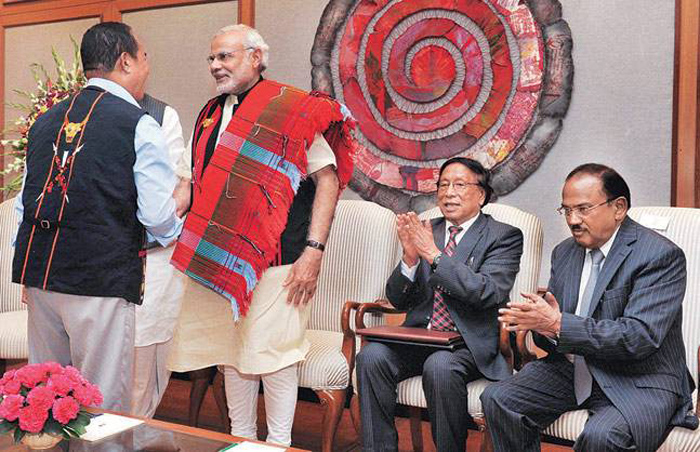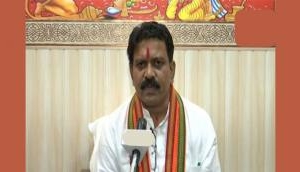
- The arrest of JNUSU president Kanhaiya Kumar has created a furore over the sedition law in India.
- During the 2014 Lok Sabha elections, the NDFB (Songbijit) faction openly came out in support of the Bharatiya Janata Party (BJP)
- Does the Indian state, given its own history of reaching out to separatist groups, hold the right to charge any of its citizens with sedition?
Is it seditious to be sympathetic towards a secessionist? The arrest of JNU Students Union President Kanhaiya Kumar has created a furore over the sedition law in India (Section 124A of the Indian Penal Code).
While there is no video evidence in the public domain which suggests that Kumar was involved in the anti-India sloganeering at the university on 9 February, Delhi Police, at the behest of the Home Ministry, charged him with sedition on 13 February.
However, even if one assumes Kumar to have been involved in the same, does it necessarily make sense to slap sedition charges against him? Does the Indian state, given its own history of reaching out to separatist groups, hold the right to charge any of its citizens with sedition?
Reaching out to the 'good terrorists'
Since the Narendra Modi-led government came to power in 2014, one of its biggest achievements has been reaching a peace settlement with the Naga secessionist group National Socialist Council of Nagalim (NSCN-IM).
The same NSCN-IM, which, in the mid-90s, massacred hundreds of innocent Kuki civilians in one of the biggest genocides of modern-day India.
The Modi government has also continued to engage with surrendered/arrested leaders of United Liberation Front of Assam (ULFA), with whom the UPA government initiated peace talks a few years ago.
ULFA, over the past three decades, has been responsible for a spate of killings in Assam, including the infamous Dhemaji bomb blast in 2004, where 18 schoolchildren were killed.
The same strategy has been followed with National Democratic Front of Bodoland (NDFB), which was responsible for the 2008 serial bomb blasts in Assam, resulting in the deaths of nearly 100 civilians.
Given the way Kanhaiya Kumar and his fellow JNU students have been hounded for the events of 9 February, isn't the Indian government equally seditious for shaking hands with terrorists like Thuingaleng Muivah and Isak Chisi Swu?
If the sloganeering by a bunch of students is an insult to the Indian Army (hint: Times Now's campaign connecting the JNU incident to Siachen martyrs), what does one make of Narendra Modi extending an olive branch to NSCN-IM leaders? Both ULFA and the Naga insurgent groups have been responsible for killings of many Indian soldiers in the past.
BJP's 'anti-national' buddies
During the 2014 Lok Sabha elections, the NDFB (Songbijit) faction, which broke away from the pro-talks NDFB group, openly came out in support of the Bharatiya Janata Party (BJP).
Bhabadev Goswami, a BJP leader from Assam's Sonitpur district, confirmed to a local news channel on 30 March, 2014, that the party had received unequivocal support from both the pro-talks (headed by Ranjan Daimary) and Songbijit factions of NDFB.
RP Sarma, who went on to win the Lok Sabha seat from Tezpur, was also reported to have been aware of the meeting between BJP and the two NDFB factions.
On 1 May, 2014, NDFB (Songbijit) men went on a rampage in Assam, killing 33 Bengali Muslims for allegedly voting against parties backed by the insurgent groups.
Less than eight months later, the insurgent group once again launched a series of strikes in time, this time targeting Adivasi tribals. Close to 80 people were killed in the attacks.
Today, the same BJP, which very recently shook hands with terrorists, is distributing certificates of nationalism to the citizens of the country.
Sedition and the Indian state
The Indian Constitution guarantees freedom of expression as a fundamental right to its citizens. Right to free speech and expression is one of the core tenets of any liberal, progressive democracy.
Unfortunately, India also has a one-and-a-half century old sedition law, Section 124A of the Indian Penal Code, which was formulated by the British. The law has been used to suppress voices of dissent in the past, most notoriously by the UPA government against cartoonist Aseem Trivedi.
Today, JNUSU President Kanhaiya Kumar remains accused of sedition. Section 124A has, sadly, become a tool to crack down on one of the fundamental rights guaranteed by the Constitution to every Indian citizen.
Given the way Section 124A has been used by the Indian state, the law itself has become more seditious than the voices which the state has tried to suppress using it.
The Indian state today faces a major dilemma: whether to keep in place a law brought into place by the British, or allow space for better public discourse by removing it altogether.
In August, 2014, Narendra Modi set up a committee to root out 'obsolete laws'. However, BJP's stance on archaic laws like Sections 124A and 377 does not help endorse its commitment towards upholding India's liberal and democratic values.
First published: 17 February 2016, 7:42 IST







![BJP's Kapil Mishra recreates Shankar Mahadevan’s ‘Breathless’ song to highlight Delhi pollution [WATCH] BJP's Kapil Mishra recreates Shankar Mahadevan’s ‘Breathless’ song to highlight Delhi pollution [WATCH]](http://images.catchnews.com/upload/2022/11/03/kapil-mishra_240884_300x172.png)

![Anupam Kher shares pictures of his toned body on 67th birthday [MUST SEE] Anupam Kher shares pictures of his toned body on 67th birthday [MUST SEE]](http://images.catchnews.com/upload/2022/03/07/Anupam_kher_231145_300x172.jpg)






